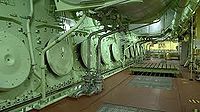Difference between revisions of "Explosion Hatches"
(Created page with "Category:Explosion Safety{{Knoppen}} <noinclude><!------------------------------------------------ * READ THIS FIRST * Only edit this page if you can improve the content. * ...") |
PurplePen19 (talk | contribs) |
||
| Line 7: | Line 7: | ||
* Please start editing this page after the /noinclude | * Please start editing this page after the /noinclude | ||
* -------------------------------------------------></noinclude> | * -------------------------------------------------></noinclude> | ||
[[File:Explosion Hatches_1.jpg|thumb|200px|right|Explosion Hatches]] | |||
'''Explosion Hatches''' or explosion relief vents are access hatch or door which allows the door or hatch to be shut and locked during normal operating pressures, but releases when excess pressure is applied from inside to protect occupant safety and structural integrity. According to international standards, the opening size must be large enough to allow the shockwave to be safely dispersed and prevent injury to occupants and damage to the structural integrity of a building. The size of the explosion vent must be calculated by a recognized and specialized construction engineer. When these calculations are performed, factors such as the type of explosion risk (gas, solid or liquid), placement of the vent, theoretical extent of the shockwave, the construction of the building and the distribution of space within the building must be considered. | |||
To protect occupants, the release of poisonous gasses and flying shrapnel released by an explosion must be taken into account, and if no containment solutions are in place, the direct area around a building may be declared a danger zone. | |||
Latest revision as of 06:05, 22 October 2012
Explosion Hatches or explosion relief vents are access hatch or door which allows the door or hatch to be shut and locked during normal operating pressures, but releases when excess pressure is applied from inside to protect occupant safety and structural integrity. According to international standards, the opening size must be large enough to allow the shockwave to be safely dispersed and prevent injury to occupants and damage to the structural integrity of a building. The size of the explosion vent must be calculated by a recognized and specialized construction engineer. When these calculations are performed, factors such as the type of explosion risk (gas, solid or liquid), placement of the vent, theoretical extent of the shockwave, the construction of the building and the distribution of space within the building must be considered.
To protect occupants, the release of poisonous gasses and flying shrapnel released by an explosion must be taken into account, and if no containment solutions are in place, the direct area around a building may be declared a danger zone.
